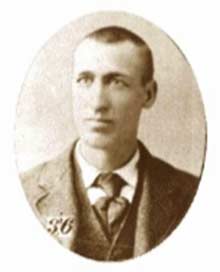Related Research Articles

John Luther "Casey" Jones was an American railroader who was killed when his passenger train collided with a stalled freight train in Vaughan, Mississippi.

The Virginian Railway was a Class I railroad located in Virginia and West Virginia in the United States. The VGN was created to transport high quality "smokeless" bituminous coal from southern West Virginia to port at Hampton Roads.

The Bristol Sessions were a series of recording sessions held in 1927 in Bristol, Tennessee, considered by some as the "Big Bang" of modern country music. The recordings were made by Victor Talking Machine Company producer Ralph Peer. Bristol was one of the stops on a two-month, $60,000 trip that took Peer through several major southern cities and yielded important recordings of blues, ragtime, gospel, ballads, topical songs, and string bands. The Bristol Sessions marked the commercial debuts of Jimmie Rodgers and the Carter Family. As a result of the influence of these recording sessions, Bristol has been called the "birthplace of country music". Since 2014, the town has been home to the Birthplace of Country Music Museum.

The Roanoke Shops is a railroad workshop and maintenance facility in Roanoke, Virginia. Between 1884 and 1953, the shops produced 447 steam locomotives, all for the Norfolk and Western Railway (N&W). The Roanoke Shops built the N&W's famous Big Three class steam locomotives; the 4-8-4 class J, the 2-6-6-4 class A, and the 2-8-8-2 class Y6. In late 1953, the Shops built their final steam locomotive, making it last standard gauge steam locomotive built for revenue service in the United States. In 2020, N&W's successor, Norfolk Southern, abandoned the Shops and Genesis Rail Services leased the property in July 2023.

The Wreck of the Old 97 was an American rail disaster involving the Southern Railway mail train, officially known as the Fast Mail, while en route from Monroe, Virginia, to Spencer, North Carolina, on September 27, 1903. Travelling at an excessive speed in an attempt to maintain schedule, the train derailed at the Stillhouse Trestle near Danville, Virginia, where it careened off the side of the bridge, killing 11 on-board personnel and injuring seven others. The wreck inspired a famous railroad ballad, which was the focus of a copyright lawsuit and became seminal in the genre of country music.
The Norfolk and Western J class was a class of 14 4-8-4 "Northern" streamlined steam locomotives built by the Norfolk and Western Railway (N&W) at its Roanoke Shops in Roanoke, Virginia, between 1941 and 1950. The most powerful 4-8-4 locomotives ever produced, the J class were part of the N&W's "Big Three" that represented the pinnacle of steam technology.
"Engine One-Forty-Three" is a folk ballad in the tradition of Anglo-American train wreck songs. It is based on the true story of the wreck of the Chesapeake and Ohio Railway's Fast Flying Virginian (FFV) near Hinton, West Virginia in 1890.
Blind Alfred Reed was an American folk, country, and old-time musician and singer-songwriter. He was one of the artists who recorded at the Bristol Sessions in 1927, alongside more famous names such as Jimmie Rodgers and The Carter Family. He played the fiddle along with his son Arville, who played the guitar. He is perhaps most well known for the songs "The Wreck of the Virginian" and "How Can a Poor Man Stand Such Times and Live?", the latter of which has been covered many times, including versions by Bruce Springsteen, Ry Cooder, and the New Lost City Ramblers.

Norfolk and Western 611, also known as the "Spirit of Roanoke" and the "Queen of Steam", is the only surviving example of Norfolk and Western's (N&W) class J 4-8-4 type "Northern" streamlined steam locomotives. Built in May 1950 at N&W's Roanoke Shops in Roanoke, Virginia, it was one of the last mainline passenger steam locomotives built in the United States and represents a pinnacle of American steam locomotive technology.
The 21st Century Steam program was conducted by the Norfolk Southern Railway from 2011 to 2015, featuring four classic steam locomotives pulling passenger excursions along Norfolk Southern rails in the eastern United States. The last train was to be Southern 4501's Piedmont Limited excursion trip from Atlanta, Georgia, to Toccoa, Georgia, but cancelled on October 1 due to Hurricane Joaquin.

Orthophonic Joy: The 1927 Bristol Sessions Revisited is a double-CD produced by Grammy Award-winner Carl Jackson, a Bluegrass and country music artist, as a benefit for the Birthplace of Country Music Museum in Bristol, Tennessee. The project was conceived by executive producer Rusty Morrell, a Bristol native who was well acquainted with the story of the historic 1927 Bristol Sessions and imagined a modern tribute to the sessions that have been dubbed the "big bang" of country music. The project includes 37 tracks - 18 songs and 19 spoken word tracks that provide context. WSM disc jockey and country music historian Eddie Stubbs narrates the project, and a who's who of country artists recorded the new versions of the old classics. Jackson recorded the album between 2013 and 2015. It was released by Sony Legacy Recordings on May 12, 2015.

On February 4, 2018, the southbound Amtrak Silver Star No. 91 passenger train from New York City to Miami collided with a stationary CSX Transportation freight train in Cayce, South Carolina, just south of the state's capital of Columbia on CSX's Columbia Subdivision. Two Amtrak crew members were killed and 116 other crew and passengers were injured.

American Epic: The Best of The Carter Family is a compilation of Carter Family songs recorded between 1927 and 1933 and released in 2017 to accompany the award-winning American Epic documentary film series. The album was released as a 15-track download and a vinyl LP.

The 1837 Suffolk head-on collision was the first ever head-on train collision to result in fatalities. The accident occurred on August 11, 1837 in Suffolk, Virginia, United States.
References
- ↑ https://www.gendisasters.com/west-virginia/17883/ingleside-wv-train-collision-may-1927 Ingleside, WV Train Collision, May 1927
- ↑ Long Steel Rail: The Railroad in American Folksong by Norm Cohen, David Cohen (Urbana : University of Illinois Press, 2000)
- ↑ Johnson, David W. "Did Bristol Sessions Produce Country Music's 'Big Bang'?" Knight Ridder Tribune News Service: 1 July 2002.